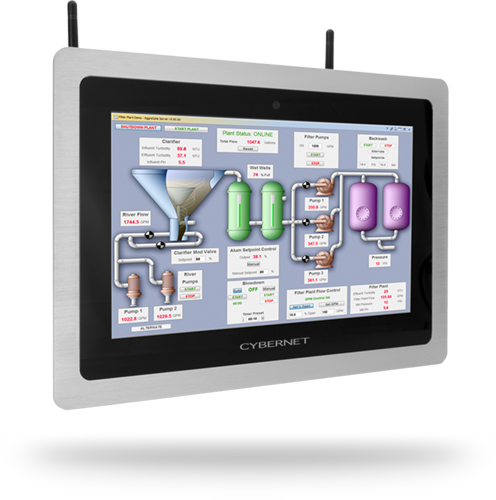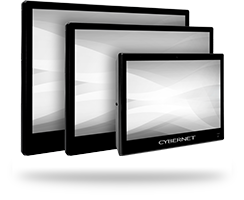The industrial sector is increasingly digital and data-driven, as businesses look for more efficient and flexible tools. For many, upgrading their operations comes down to industrial PCs vs. PLCs, or programmable logic controllers. While these devices operate on similar principles, understanding their differences is critical to using them effectively.
What is an Industrial PC?
Industrial PCs are exactly what their name implies: personal computers designed specifically for the industrial sector. Compared to your typical consumer-grade PC, an industrial PC will have design features that let it handle harsh operating conditions. They will be tested under strict certifications such as IEC 60068 standards, and use waterproof casings, chemically-hardened touchscreens, and fanless cooling to ensure their reliability.
What is a PLC?
A PLC is a very basic type of computer most often used in industrial automation. First designed in the 1970s, PCs are equipped with non-volatile memory, meaning they retain information even when they have no power supply. They are also equipped with input/output ports that let them receive and send information. Their simple design and low cost make them very easy to implement in different roles.
Applications for Industrial PCs and PLCs
When it comes to PLC vs. industrial computer, the two devices share an operating environment and sometimes use cases. However, their differences in processing power and flexibility mean they are typically used in radically different roles.
Industrial PCs
Industrial PCs have an incredibly wide range of applications, depending on their design.
- Industrial panel PCs excel as user interfaces for machinery and equipment, thanks to their large and responsive touchscreens. They also typically have greater processing power than mini PCs or tablets.
- Rugged mini PCs are most frequently seen in automation, edge computing roles, or mounted on vehicles, where their small size makes them easier to integrate.
- Rugged industrial tablets are perfect for employees in mobile roles, as their lightweight design makes them easy to carry throughout a work shift.
However, these examples are just the tip of the iceberg, and all three types of industrial PC can be used in far more applications.
PLCs
PLCs are often used in straightforward roles that have very little variance or unpredictability associated with their operations. An everyday use case for PLCs is in automated gate systems, where they control the gate’s opening and closing. When the PLC’s sensors receive a recognized input, such as a keycard being swiped or a code being entered, it commands the gate’s motors to activate and open the way, as per their pre-programmed output. Once a certain period of time has passed or a new input comes through (such as other sensors detecting when the vehicle has passed through the gate), the PLC orders the gate’s motors to close it.
Other use cases for PLCs include industrial automation, remote control systems, and power grid management.
Benefits of Industrial PCs vs. PLCs
Despite their overlap in roles, industrial PCs and PLCs have distinctly different advantages.
Advantages of Industrial PCs
The primary benefit of industrial PCs, especially when compared to PLCs, is their superior processing power and flexibility. With dedicated CPUs and large amounts of RAM, PCs can handle far more complex and demanding programs than a PLC ever could. This high performance is necessary for more demanding industrial applications, such as supporting Internet of Things networks or controlling more complex industrial robots.
Another advantage that industrial PCs have is that they can serve as a user interface as well as a computing solution. Industrial panel PCs and tablets feature touchscreens that users can use to input commands and access digital tools, removing the need for a mouse and keyboard.
Lastly, PCs can be updated with new programs and tools, whereas PLCs are typically pre-programmed with their logic. For example, an industrial tablet can be used for inventory management for a business one week and remote communications at a construction worksite the next.
Advantages of PLCs
While a PLC will never compete with a dedicated PC in terms of computational power, they still have their use cases. Their simplistic design means that PLCs are very cheap when compared to other computer solutions, making them ideal for applications that don’t require much in the way of processing power. They also require less electricity to power than most PCs, which can be very useful in applications that can’t support standard power cables.
Industrial PC vs. PLC: Which One Should You Use?
The question of industrial PC vs. PLC primarily comes down to what your intended use case is. If you just need a device to manage your gate system or to automate your building’s lighting system, a PLC should probably be more than sufficient. On the other hand, if you have something more complex in mind, such as your warehouse’s inventory management system or controlling an assembly line, you will probably need the processing power and flexibility of an industrial PC.
If you still aren’t sure, try consulting with an original equipment manufacturer (OEM). OEMs are experts in how their products are used and have guided other businesses in the past to find the right solution for them. They can even customize their products to fit the exact needs of the end-user better.
Industrial PCs from Cybernet Manufacturing
Understanding the differences between industrial PCs and PLCs is critical in an increasingly digital sector. By using the appropriate device in the proper role, businesses can reap the benefits of computer support without breaking their budget.
If your company needs industrial-grade computers to support its workflows, contact the team at Cybernet Manufacturing. We’d be happy to explore how our industrial panel PCs, mini PCs, and tablets can be customized to suit your specific needs.

